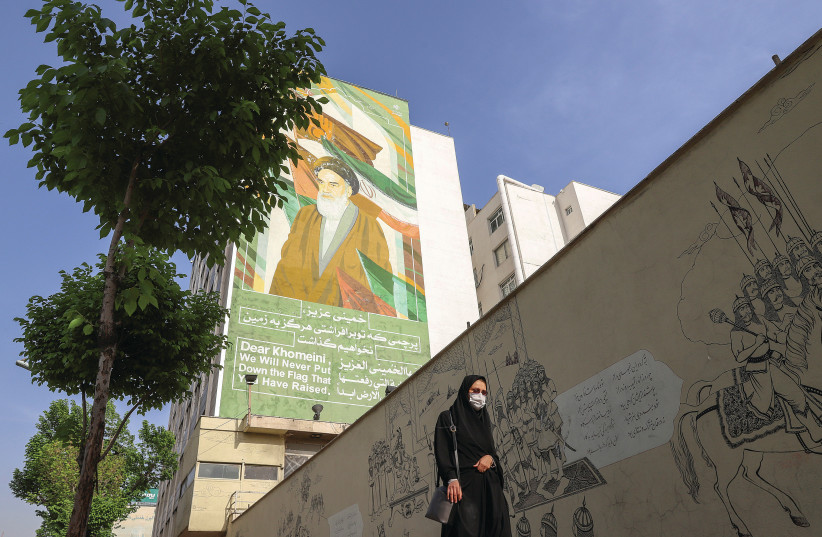On May 20, 2020, these writers argued in this same column that as the great divide is widening between a sacerdotal state in Iran on one hand and a secular society on the other, the time has come to bury the former and usher in the full development of the latter. For in the longer run, Iran, as a Huntingtonian core state in the geographical heart of history, has every necessary historical precondition to becoming a culturally and economically fully developed modern nation-state.
We further argued that there is no instance in modern history of a totalitarian regime rolling back from ideology to reality, from revolutionary principle to normalcy. While concluding that the technocratic apparatus of the state will inevitably enter into conflict with the ideological cult ruling over the destiny of its deliquescent revolution, we called for a resolute, pragmatic and patriotic minority to give this ancient nation a new state. Finally, we envisioned that such a minority could and should take the form of a technocratic-military coalition.
Nearly a year and a half have passed since the publication of that tribune here in The Jerusalem Post. Every single major event has, since then, supported our argument and the urgency of our recommendations.
The advent of Ebrahim Raïsi’s government, a man described by well-informed insiders as a nearly illiterate psychopath directly involved in mass murders in the 80s, may well be the best indicator of what we recognized then and reiterate now. Shrinking to its narrowest base of clientelism, the regime has aligned whatever remains of its hardcore ideological cult, a pathetic gallery of semi-literate thugs, enchanters, eunuchs, magicians and sorcerers. And as the booty is shrinking fast, the pathetic coterie faces the daunting task of providing for its own onerous security, while silencing the growingly vociferous anger of the sans-culottes. And the clock is ticking…
As the Observatory of Poverty within the Labor Ministry has recently reported, “26.5 million Iranians live in absolute poverty, while last year’s pandemic has destroyed 75% of the revenue of the lowest deciles.”

While the inflation rate runs officially at well above 40%, the continuation of this trend toward the 60% threshold “may well cause an economic collapse with its cohort of social and security consequences,” according to the chairman of the Iran-China Chamber of Commerce.
In yet another recent and alarming report, the Plan & Budget Organization has warned that in the event sanctions are not lifted, falling GDP will, within the next two to three years, put the state “on the brink of bankruptcy.” In short, what is looming at the Iranian horizon in the medium-term is a failed state.
“Rulers,” Richelieu once famously said, “are the slaves of their resources.” As resources shrink, the clash between the technocratic apparatus and the coterie of eunuchs and thugs ruling the country becomes a matter of when.
Thus, within the time frame just described, a systemic collapse is the most likely outcome for the ruling cult. As opposition figures, we argue, once again, that in the face of such a dire situation, the most desirable pragmatic solution is one embodied by a technocratic-military takeover: a provisional government of salut public.
The socio-economic dark picture may well become dreadful, in biblical proportions, if one takes into account environmental disasters in the making: using sophisticated processing of time-series satellite imageries, the Intel Lab just recently reported that “Tehran, its growing 13 million inhabitants and its critical infrastructures” are endangered by one of the fastest land subsidence rates worldwide of 25 cm per year. If nothing is done, Iran will be physically decapitated, millions thrown into migration, and the region plunged into chaos. And the clock is ticking…
Thus, as opposition figures, we once again argue that Persia’s daunting challenges necessitate a homemade iron-fist approach: as the regime’s systemic collapse approaches, the provisional government of salut public becomes an issue of national survival. With its technocratic-military backbone; its legitimacy arising from its decisions; and its program dictated by necessities, its priority will be the security of metropolitan areas, with a shopping list of rainbow-like concerns having no place in its discourse.
Recent history and the rise of “illiberal democracies” in culturally advanced countries endowed with a European tradition demonstrate that social, economic and political openings can seldom be concomitant.
The government of salut public we are calling for will have to prepare for the emergence of democracy, rather than practicing it in the midst of the looming tempest. It goes without saying that the physical and mental conditions of the supreme leader can only exacerbate the criticality of our approach and precipitate the organization of the collapse we foresee.
The reason is as simple as it is deeply rooted in our region: As the Shia Nebuchadnezzar’s mental and physical conditions deteriorate faster than those of Persia under his “devastating abomination”; with his “eunuchs, enchanters, magicians and sorcerers” unable to tell him the mystery of his pathological dreams; all may face the same biblical fate of being “torn limb by limb and their houses razed to the ground,” when chaos will set in and angry sans-culottes take matters into their own empty but revengeful hands.
What in Persia is in the making is creative destruction.
Dr. Ramin Parham is a prominent political intellectual writing extensively in Persian, French and English on Iranian affairs. Djavad Khadem, ex-minister in former Iranian prime minister Shapour Bakhtiar’s cabinet in 1979, ex-coordinator of coup plot Operation Nojeh and founder of Unity for Democracy in Iran, is an international counsel on Iranian affairs.
